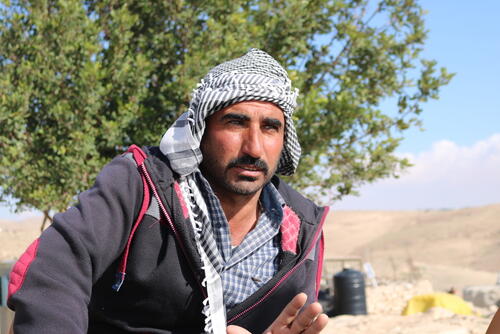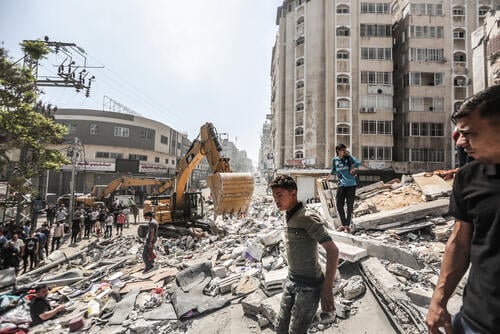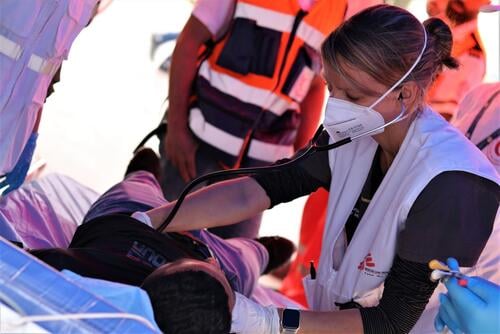Approximately 300,000 Palestinians that live in small dispersed communities in the West Bank, Palestine, face barriers to accessing healthcare. This is because more than half of the West Bank is under an ‘Area C’ designation, meaning it is under direct Israeli civil and military control. More than one-third of people living under Area C-designated zones depend on mobile clinics to access essential health services.
Reaching the nearest clinic often entails costs that people cannot afford; they must also often travel long distances with no public transportation, and bad road conditions that prevent ambulances from being able to reach communities in need. For people whose conditions usually require them to stay in proximity to health services (for example, pregnant women), they often need to stay away from home for a long period of time.
Masafer Yatta, in southern Hebron governorate, is an Area C zone where there have been virtually no medical services for a long time. National organisations providing mobile clinics have suspended their activities for a variety of reasons, including funding cuts and stricter legislation impacting local NGOs. This has been exacerbated by the pressing needs of the healthcare system as a result of the COVID-19 pandemic.
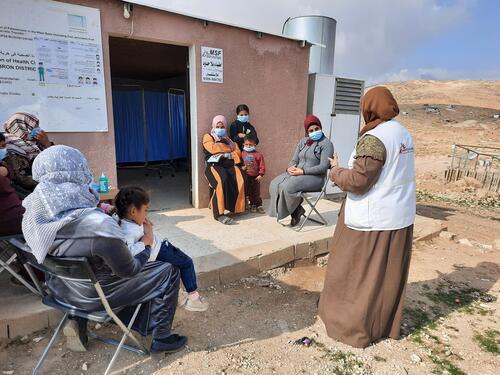
MSF teams first to provide healthcare in a year
Médecins Sans Frontières (MSF) teams have recently started visiting these communities again to provide basic healthcare, with a range of activities including general outpatient consultations (with a focus on children and patients with chronic communicable diseases), reproductive health, mental health and nutritional screening. Basic tests are also performed at these clinics and severe cases or those needing further testing are transferred to the nearest available hospital, in the town of Yatta.
Since November, MSF has been regularly visiting three areas - Dkaika, Djinba and Khirbet Al-Fakheit - and teams have just started visiting Um Gussa. Our teams include a medical doctor, a nurse, a midwife, a mental health specialist and a health promoter. Almost 300 consultations have been performed since activities started.
“For one year, no one came here, and our people had to go all the way to Yatta to get access to healthcare services,” explains Mohamad Ayoub Hamad, a community leader in Khirbet Al-Fakheit, where MSF teams carry out mobile medical activities. “It was a very difficult situation, especially for pregnant women. Put simply, families without a car really face a big problem.”
Women especially affected by lack of local healthcare services
The women living in the area, in particular, face challenges accessing healthcare. Men regularly go to the nearest town, Yatta, to buy and sell products and they can seek health services there if needed. But women usually work around the clock on farms and, as they have no replacement, many tend to neglect their health and wait until their condition becomes serious before seeking medical attention.
In addition, there is no public transport system in Masafer Yatta and, even if some families have a car, these are considered ‘illegal’ as they are not registered and can be confiscated at any time.
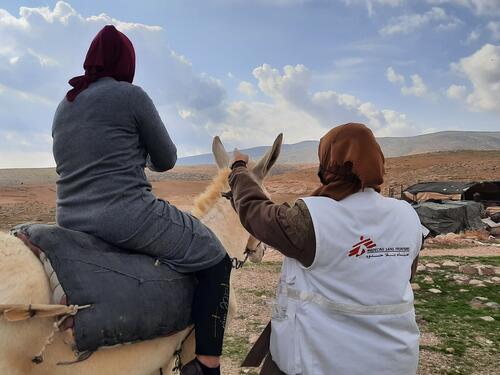
Rasha* travelled to the mobile clinic in Khirbet Al-Fakheit by donkey from her nearby village.
“Things are completely different now. At least we have a doctor visiting us weekly and we can get medication,” says Rasha. “Before, if I needed any for myself or the kids, I would go around the village to all the houses to see if the neighbours had some.”
The week before, Rasha had brought her two children for a check-up. In addition to all her problems, she says that they are now short of money at this time of the year as they do not have cheese or buttermilk to sell.
Threat of demolition adds to challenges for health structures
An additional hurdle for healthcare in this area is that the people in Area C are not allowed to build any permanent or semi-permanent structures without a permit from Israeli authorities, which is rarely granted. Even the humble structures used by MSF for the mobile clinics, like the one in Khirbet Al-Fakheit, are mostly under threat of being knocked down. Since 2012, the school and the clinic next door have had a demolition order which means that they could be bulldozed any day.
“We hope that some national organisations or the Palestinian Ministry of Health will soon have the capacity and the funding to provide services again to the communities living in areas like Masafer Yatta,” says Katharina Lange, MSF’s Hebron project coordinator.
*Name changed to protect privacy.
MSF started working in the Occupied Palestinian Territories in 1989 focusing on delivering primary healthcare in Gaza. In 1996, mobile clinics started in some Hebron areas (C and H2) and a decade later the activities were handed over to another organisation. Besides the medical activities in Hebron, MSF currently runs mental health programmes in Hebron and Nablus, in the West Bank. In Gaza, MSF runs inpatient departments and clinics to treat patients with trauma and burns. We provide plastic and orthopaedic surgery to close large wounds and begin the process of repairing loss of and damage to the bone, as well as providing dressings, physiotherapy, health education and psychosocial support.



